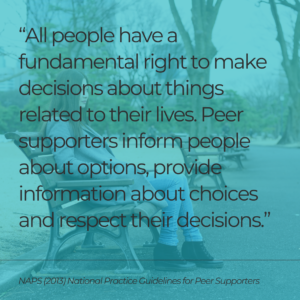Peer Support is an extremely effective and evidence-based mental health service that uses a person’s lived experience to help others in their recovery. This blog is part of our new yearlong series, where each month we will take a deeper look at what it means to work as a Peer Support Specialist and how to adhere to the 12 ethical guidelines created by the National Association of Peer Supporters (NAPS).
For this blog, we will be focusing on the guideline that states peer support is person driven.
 Why is this guideline important?
Why is this guideline important?
In the field of Peer Support, one of the most important things to keep in mind is that people are the experts on themselves. Providers, friends, and family may have some understanding of what is happening for a person, but they will never have the full picture. This means that when it comes to important decisions regarding a person’s care, the person involved should have the final say.
In an article hosted on the Wellness Recovery Action Plan website titled “Being the Expert on Yourself”, the author of the article provides insight into their own experience when it comes to supporting their personal recovery.
“When you come upon troubling times, experience distressing symptoms or need to make some life changes, you look outside yourself for answers… And while all of these people may be able to provide some help, information or guidance, you may overlook the most important authority – yourself.”
The author acknowledges the importance of supportive resources and relationships like providers, family members, and friends. However, the most important person when it comes to making decisions about their recovery is the person themselves. And unfortunately, not only are people discouraged from taking charge of their own mental health care, but they often don’t know how to begin doing so. This is where a Peer Support Specialist can step in and provide the knowledge and support needed in order for people to direct their own care.
What does this look like in practice?
Recovery is an extremely personal thing, as many Peer Support Specialists may already know. While there are many wonderful recovery programs available, not all of them are designed with the intent to be personalized. This can sometimes mean that deviations from these programs are discouraged in order to ensure that recovery is reached by every individual who participates.
Peer Support Specialists can support the people they work with by helping them explore options and make informed choices. Even if a program has been successful for others, the individual gets to determine if it is right for them. You can inform and encourage individuals to find a path feels right for them. If you work for an organization that feels strongly about certain programs, especially if they offer them directly, you may have to step in on behalf of some individuals. Advocate that it is important for the person to be able to make an informed decision about whether or not they would like to participate in those programs. And if they decide not to go that route, then it is more than okay to try and seek out something else they feel they would like to get involved in.
Information can be the best way to support someone in being self-driven. The more someone knows about the path ahead the better they can feel about making decisions for themselves. Even if you haven’t had personal experiences with certain treatments or programs, you can encourage the peer to research those options on their own or with you in order to understand what each path can do for them.
How to use this guideline moving forward
As a Peer Support Specialist, anytime you catch yourself or others making assumptions about what is best for someone, this should be a red flag that signals the need to engage in the value of being person driven. This doesn’t mean that you can’t bring new options or ideas to the table, as Peer Specialists can also encourage people to try new things or step out of their comfort zones from time to time. In fact, sometimes people may not be able to choose what they want to happen in their mental health treatment if they don’t have a variety of options to choose from.
Just be sure that whatever you decide to do in your work together, that you are encouraging that person to choose what feels right for them and their own personal journey.

Pingback:Peer Support IRL (in real life) with Anginet Page - Colorado Mental Wellness Network
Pingback:https://processbuild48083.wixsite.com/sdehnkys
Pingback:andere.strikingly.com